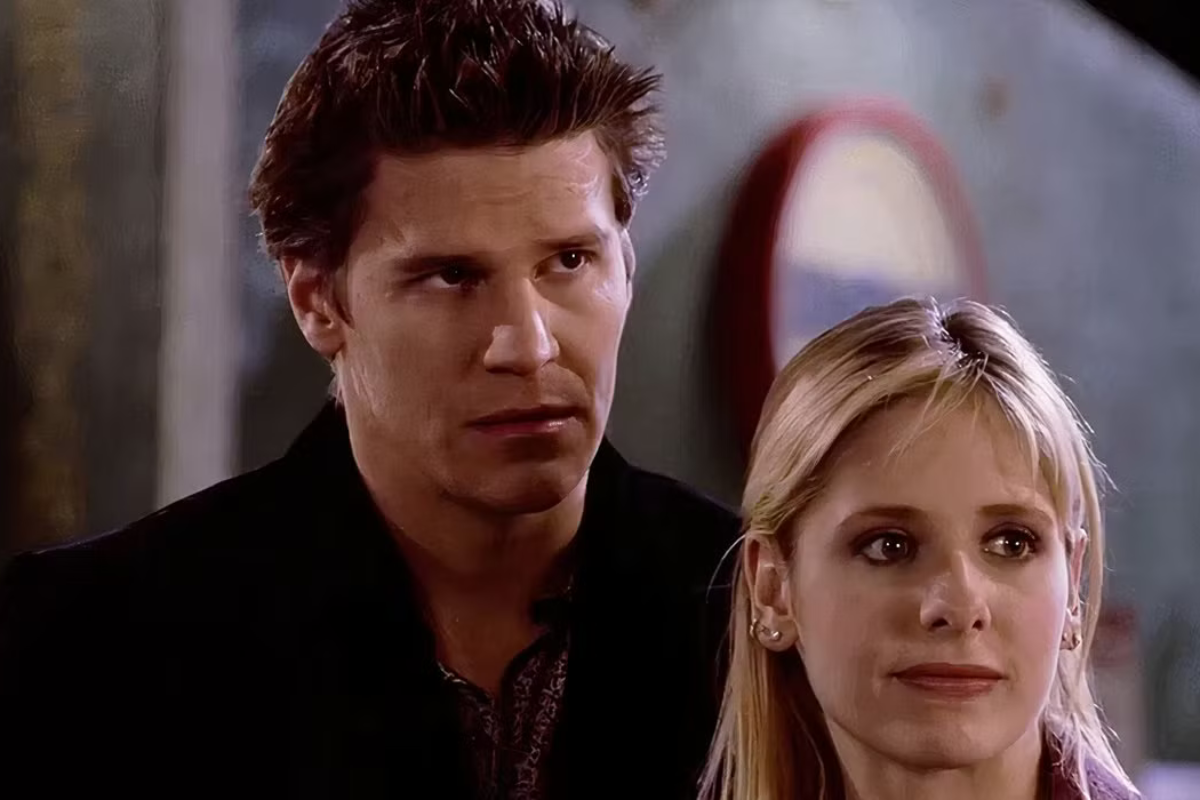Notes from the Margins: Every Article on Screenwriting You Never Have to Read Again
Danny Manus boils down every article on screenwriting that ever existed into one, no-nonsense post. Informative and beyond entertaining!
Danny Manus boils down every article on screenwriting that ever existed into one, no-nonsense post. Informative and beyond entertaining!
Danny Manus is an in-demand script consultant and founder of No BullScript Consulting and author of No B.S. for Screenwriters: Advice from the Executive Perspective. Follow Danny on Twitter @dannymanus.
I’m not sure if you’ve noticed, but there are THOUSANDS of articles on screenwriting out there, and 90% of them are just regurgitated bullshit said in a different, quippier, blunter or more motivational way. Most of them give totally contradictory facts and advice that make your head spin. Most of them don’t set the context or audience they are addressing, so the information is misinterpreted. And most of them are written by people who have no business giving advice – like that writer who optioned that one script once that never got made or that “studio reader” who has done coverage on 50 scripts. Call me when it’s 500.
I wanted to bring together all the information given in ALL of these articles so no more ever have to be written. A final recap on all those commonly asked questions and tips that are clogging up screenwriting blogs, websites, columns and Facebook groups. All the keywords, all the lessons, all the points made, all the tips, all the answers you need in a recap of Sorkin proportions… Ready? Let’s do this.
Set an egg timer.
Write an hour a day.
Write a paragraph a day.
Write 8 hours a day.
Just fucking write.
Keep writing!
Stop writing!
Stop writing that!
Stop writing like that!
Start writing like this!
Now keep writing like this more!
Now write something different.
Don’t write something too different.
Write something original.
There’s no such thing as an original idea.
You need a strong, original hook.
Your hook isn’t strong or original enough.
Your hook doesn’t translate internationally.
Your project has to be sellable overseas.
Most comedies, dramas, small budget indies and love stories don’t sell overseas.
Know your project’s demographic.
Be as focused in demographic and tone as possible.
Make your demographic as broad as possible.
Make the script elevated. Elevated means there is something smarter, higher concept, more complex than other stories in the same genre. It has that something ‘Extra.’
Audiences aren’t smart enough to understand elevated stories.
Use Final Draft or Movie Magic. Don’t write in Word. Period.
Celtx is fine when starting out, but not once you start thinking about going pro.
Write what you know, unless everything you know is boring and stupid.
Take what you know and use it to inspire something more cinematic and visual.
Don’t write about trying to break into the business – that’s not YOUR story, that’s EVERYONE’S story. And no one gives a shit.
Read tons of scripts.
Read pro scripts, read amateur scripts, read produced scripts, read scripts that will never ever be produced, read Blacklist scripts, read Nicholl winning scripts, read Bloodlist scripts.
Read 2 scripts a week, every week, for a year.
Make your own notes.
Do your research.
Read the trades or Deadline every single day.
Know what is selling, know who it’s selling to, and know why it’s selling.
Information is power.
If you think it’s not part of being a writer, you’re doing it wrong.
This is a BUSINESS. Treat it as a career or it will never be one.
Write what sells.
Dramas and period pieces don’t sell.
There are dozens of period pieces set up.
Every year, a drama wins the Oscar.
Trends are always changing.
Don’t follow the trend.
Never write a huge budget epic as your first project.
Everyone wants big projects.
Never write a project you don’t own the rights to.
You definitely need an agent. Agents will help you sell your project.
You don’t need an agent – you need a Manager!
Agents will NOT deal with writers who have ONE script or ONE idea so stop wasting your time.
Managers are there to invest more in your long-term career and guide you through it.
They should never charge you to rep them.
Don’t bother with agents who don’t live in L.A. or NY.
It’s impossible to find a rep.
It’s not hard at all to find representation. If you’re good.
Most reps don’t accept unsolicited queries.
No one deletes an email without glancing at it, even for a moment.
Send mail queries, email queries, use online query sites, post on websites, make cold calls, use social media, use consultants with industry contacts.
Have a planned 10 second pitch.
Don’t be afraid of pitching an assistant, it’s probably the best you’ll get.
Never start a conversation or pitch with a rep with the words “I wrote a script…”
Managers will read anything – specs, TV pilots, short films, short stories, plays, skits, books, blogs, twitter feeds, etc.
Have a vision for your career and know what kind of writer you are.
It’s hard to sell you if you don’t know what you are.
Be a multi-hyphenate.
Reps will put you in a box to sell you.
Don’t fight the box, make the box work for you so you can break out of the box.
A good manager will get you a good agent.
A bad agent will tell you that you don’t need a manager.
If you’re really serious, move to L.A.
You don’t actually have to live in L.A.
Unless you want to write for TV.
Then move to L.A.
Struggling is part of it. It’s the glue that connects us all.
Unless you get in through nepotism. Then fuck you.
Getting a free option is great, but it doesn’t make you a working screenwriter.
Breaking in isn’t hard – it’s only hard if you suck.
Go to film festivals, pitchfests, conferences, classes, networking events, use social media, join Facebook groups, follow and interact on Twitter, Linkedin, use alumni networks, win contests, use well-known and well-connected Script Consultants, intern somewhere, become an assistant and break in from the INSIDE.
Referrals are the key to success.
Do NOT pitch your script the first time you meet someone. Don’t even mention it.
Cultivate relationships that you can use later on when you’re REALLY ready.
Chances are you’re not ready.
Learning how to network the right way and making good first impressions will make up for not being the best writer (or smartest executive) in the room.
A writer’s Desperation can be felt from across a room and it’s an instant turn off.
Be NORMAL.
Read screenwriting books.
Most books are worthless and overcomplicated for no reason.
You need to find your own voice and get that across for people to take notice.
Follow the formula!
Fuck the formula!
Learn the formula and follow the formula until you can say ‘fuck the formula!’
How many story beats does your script have?
How many other scripts has your story beaten?
No executive ever counts story beats. They count trailer moments.
Write for therapy. Write as a hobby. Write as a creative outlet. Write for money.
But don’t write for any of those reasons if you want to write as a career.
You want to write and sell screenplays? Great!
Write the book.
About 250,000 books are published every year.
About 250 movies are released in the U.S. theatrically every year.
Write the graphic novel.
Write the short. Make it yourself.
Sell the idea. Hire someone else to write it. Fuck!
Can it be a video game?
Highest grossing film Avatar made $2.8 Billion after 5 months of worldwide release. Video game Call of Duty: Ghosts made $1 Billion in its first DAY of worldwide release.
Raise funds yourself and become a producer. Launch a Kickstarter campaign. Get crowd-funding and crowdsourcing. Compete with Spike Lee and Zach Braff. Bastards.
Don’t be afraid to work for free.
Real writers don’t work for free.
To break in, chances are you are going to need to work for free.
I’ve never ever met a writer who hasn’t worked for free on something. Ever.
Your script is worth all the blood, sweat, tears and time you have put into it.
Your script is worth exactly nothing until someone offers to pay you something for it.
Producers need to have some skin in the game.
Producers are your cheerleaders and don’t make any money until they get your project made. That is their skin in the game.
Never ever pay a producer to be attached on your project.
Do as many drafts as it takes for as long as it is a productive and positive relationship and experience.
The development process is long and hard – that’s why they call it Development Hell.
There’s a difference between the development process, and being taken advantage of.
Always ask a producer what their game plan is and where their strongest relationships are.
Always address notes in a calm, professional manner and offer concrete reasons or suggestions why you refuse to change something.
You will have to kill your babies. Live with it.
Rewriting is hard and takes more than 3 days.
Rewriting is not something you do the day before a contest deadline.
Enter screenwriting contests – they’re a great way to break in.
Stop wasting your fucking money on so many contests.
Pick 6-8 contests to enter. If you don’t advance in any of them, your script’s not good enough. Or your writing’s not good enough yet. Stop submitting and start rewriting.
Rewriting is hard and takes more than 3 days.
Rewriting is NOT polishing. A polish is dialogue, spacing, details, transitions, making it pop.
Rewriting is fundamentals – character, concept, story, plot, direction, motivation, emotion.
When rewriting, re-examine everything from concept to hook to protagonist to plotting.
Don’t be afraid to start over.
Don’t scrap everything and start over just because you can.
Don’t lose what was great about your project to begin with.
Rewriting is hard and takes more than 3 days.
Always outline your story.
Unless you don’t have to.
No one will ever read an outline or treatment. It doesn’t fucking matter how long it is.
Find a process that works for you.
Write a synopsis.
Create a one-sheet.
One-Sheets are shorter and prettier than synopses.
Write a great query letter.
No one reads query letters.
Except everyone who says they don’t.
If you don’t know how to write a query letter, hire someone who does. Sending a bad query letter is literally throwing money, time and energy out the window.
Executives and reps keep a folder of all their worst query letters and they don’t forget. But they do like to share.
Have a great logline.
Loglines aren’t taglines.
A logline is your story told succinctly (under 40 words) in an intriguing way that makes it sound original.
A logline is not your inciting incident.
Don’t try to sell your concept in 5 words or less.
Unless you can.
Always use comparison movies to create context for your project (but not in the logline).
Make sure you’re putting your script in the right context.
Producers only read the first 15 pages.
Unless it’s good.
Create a world, create a context, create a character we connect to, create a great conflict for the character. They’ll keep reading.
Focus, Context, Connection, Character, Conflict – remember those words as you write.
Visual, Compelling and Cinematic – remember those words too.
We have to love your characters.
Unless we love to hate them.
Put your hero on a journey.
That journey better be awesome and have a purpose.
Never ever use the word journey.
Match the right protagonist with the right story that makes them shine.
Create obstacles, dilemmas, reactive moments, twists, high stakes, and subplots.
Tell a simple story - with a clear beginning, middle and end - really well.
Give your character a dilemma. Give them a deal-breaker. Give them a goal. Give them a motivation. Give them a backstory. Give them strength. Give them weakness. Give them human qualities that make actors want to portray them and extra-human qualities that make them heroes. Give them a voice. Give them a strong voice. Give them a personality. Give them quirk. Give them hope then take it away. Give them everything you have.
Get professional feedback.
Only listen to feedback you think helps.
All feedback helps.
It’s the feedback you hate that is often most helpful.
Consultants are not your mommies. They help you much like a story and career therapist.
You pay therapists. Therapists don’t sit and listen to you because they had nothing better to do.
Some professional writers say never pay for notes.
Those people will never read your script or give you in-depth feedback.
Find the consultant that is right for you, your project, and your wallet.
Your script should not cost as much as your car.
No one – and I mean no one – is worth $5,000 just to read your script.
Don’t be fooled by con men, scams, and liars. Do your due diligence.
Anyone who says they have the #1 SECRET FORMULA to selling your script in any specific amount of time – is selling you a bag of crap.
There are no secret formulas. Just well-known formulas that have worked for many people over time and you don’t have to pay to hear them.
WHEW….
Are you totally fucking confused now? GOOD!
Stop reading articles on screenwriting and fucking write something.
Related Articles:
- More Notes from the Margins articles by Danny Manus
- Notes from the Margins: Cold Call Tips – The Secret Words to Getting Read and Representation
- Notes from the Margins: Cracking the Executive Code
- Balls of Steel: Script Consultants - Are They Worth It?
Danny Manus is an in-demand script consultant and founder of No BullScript Consulting, and was ranked in the Top 15 “Cream of the Crop” Script Consultants in 2010. He is the author of No B.S. for Screenwriters: Advice from the Executive Perspective. Danny shares notes, tips, lessons, anecdotes and information that will hopefully improve your writing, enlighten you about parts of the business that aren’t talked about, lessen the number of notes you get in YOUR margins, and help you further understand what breaking into this business and staying here really entails. Twitter: @DannyManus







